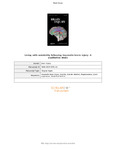Living with suicidality following traumatic brain injury: A qualitative study
Date
2020-06-12Author
Subject
Metadata
Show full item recordAbstract
PURPOSE: Numbers of traumatic brain injury (TBI) are increasing, and with suicidality post-injury presenting at 3-4 times higher than in the general population, understanding this is crucial in reducing a devastating outcome. Given the lack of literature, this study investigated the experiences of living with suicidality after TBI. METHODS: Interview data from nineteen participants with TBI from a Brain Injury Rehabilitation Unit (BIRU) in New South Wales (NSW), Australia were collected and thematically analyzed. FINDINGS: The participants (predominantly male) sustained extremely severe injuries (median PTA 60 [IQR 81.0] days) and were in the chronic phase post-injury (median 8.0 [IQR 9.0] years). Six main themes were identified; Loss of sense of self, TBI as a hidden disability, Chronic but transient suicidality, Reliance, Protective factors, and Hope. Tentative relationships between themes and subthemes were identified. CONCLUSION: Chronic suicidality after TBI was demonstrated consistently regardless of receiving long-term support. However, their engagement with protective factors such as social support, spirituality and positive personal qualities was identified. Implementing these as coping strategies during long-term rehabilitation may reduce the levels of suicidal distress. Implications, methodological considerations and future research were discussed, with the aim of improving experiences of individuals with TBI to reduce suicidality.
Collections
Publisher
Place of Publication
Journal
Volume
Issue
Pagination
Recommended, similar items
The following license files are associated with this item:


